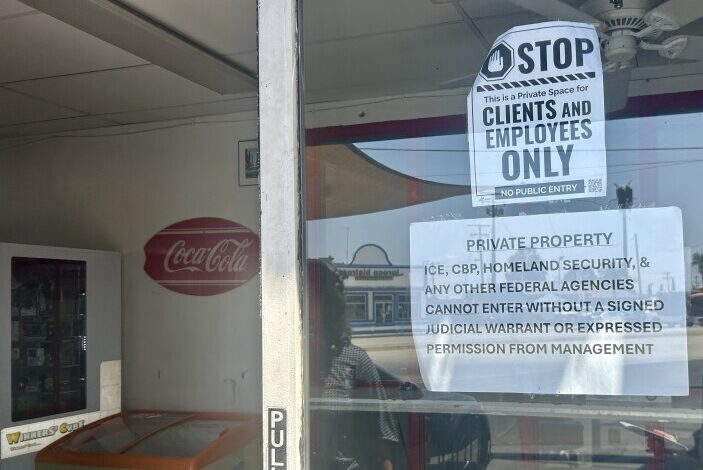ICE Raids Target Car Wash Workers in Southern California

In early June, U.S. Immigration and Customs Enforcement (ICE) agents conducted multiple raids at car washes across Southern California, focusing primarily on workers rather than employers. One of the first locations hit was Touch and Glow Car Wash in Whittier, a community with a significant Latino population. Hector Contreras, the assistant manager, described the scene as chaotic, with agents approaching from all directions. Despite his status as a legal permanent resident, Contreras was detained for approximately ten minutes while three of his colleagues were taken into custody. Since the raids began, many employees have not returned to work, creating an atmosphere of fear and uncertainty in the community.
The recent ICE operations have significantly impacted the car wash industry, which is well-known and beloved in Los Angeles. According to data compiled by LAist, car washes accounted for nearly 50% of the businesses involved in publicized immigration enforcement actions since March 27, 2023. The CLEAN Carwash Worker Center reported over 100 detentions linked to these raids, primarily affecting workers but also some customers.
Chilling Effects on the Community
The ripple effects of these raids have led to a chilling effect across Southern California. Many immigrants, as well as native-born residents, have expressed fear of leaving their homes or going to work. The focus of these raids aligns with the immigration enforcement priorities established during the Trump administration. Despite the significant number of workers detained, owners and operators of these businesses have largely escaped scrutiny. Since January, LAist found only one instance of an employer facing legal penalties for hiring unauthorized workers. In that case, the general manager of a painting company pleaded guilty to knowingly employing unauthorized individuals and received a sentence of one year probation along with 50 hours of community service.
Tricia McLaughlin, assistant secretary at the Department of Homeland Security, asserted in an email that there will be “no safe spaces for industries who harbor violent criminals.” However, Ciaran McEvoy, spokesperson for the U.S. Attorney’s Office for the Central District of California, noted the lack of immigration-related criminal prosecutions under the Biden administration.
Migration and labor experts emphasize that the allure of job opportunities in the U.S. remains a significant factor driving unauthorized migration. Ira Mehlman, media director of the Federation for American Immigration Reform, stated that addressing the economic motivations for illegal entry is crucial to reducing unauthorized immigration.
Legal Framework and Employer Accountability
The legal framework surrounding employer accountability in hiring practices stems from the 1986 Immigration Reform and Control Act (IRCA). This law established penalties for employers who knowingly hire unauthorized workers, with fines reaching up to $10,000 per illegal employee and potential prison sentences for repeat offenders. Despite this, enforcement against employers has been minimal, raising questions about the enforcement priorities of both Republican and Democratic administrations.
Experts like Tia Koonse from the UCLA Labor Center argue that many businesses are inherently disincentivized to verify employee work authorization due to their dependence on immigrant labor. During interviews with car wash owners, many claimed to have taken steps to verify their employees’ eligibility for work, relying on basic documentation such as Social Security cards and state-issued IDs.
The raids have sparked significant backlash from the community. Owners and managers reported that agents often did not provide warrants before detaining employees, leading to accusations of unlawful practices. Emmanuel Karim, operations supervisor at Bubble Bath Car Wash, expressed frustration over the swift and unannounced nature of the raids, which often lasted mere minutes.
The fallout is evident not only in the immediate fear among workers but also in the operational challenges faced by car washes. As workers hesitate to return, many businesses are struggling to maintain their workforce. Andrea Gonzalez, deputy director of CLEAN, noted that more than half of the center’s members have stopped working in the industry since the raids began.
The situation has prompted cities across Los Angeles and Orange counties to establish funds to assist undocumented residents who have lost work or are staying home to avoid potential detainment. Many undocumented workers now face additional challenges in claiming past wages owed to them due to fears of being identified as unauthorized.
Despite the tense atmosphere, some car washes are attempting to adapt. Touch and Glow has put up signs to mark private areas and has held training sessions on employee rights. Co-owner Rosio Sarabia highlighted the importance of community support in the aftermath of the raids.
“This is a state of immigrants,” Sarabia stated. “We can’t live without them.” The ongoing situation continues to illustrate the complex dynamics of immigration enforcement, labor needs, and community resilience in Southern California.






